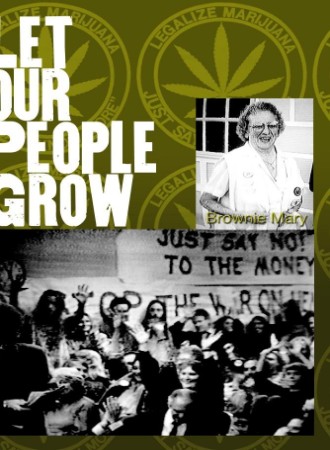
Let our People Grow: Testimonials on Medicinal Marijuana 1995
Distributed by New Day Films,190 Route 17M, P.O. Box 1084, Harriman, NY 10926; 888-367-9154 or 845-774-7051
Produced by New Day Films
Directed by Suzanne Girot
VHS, color, 26 min.
Adult
Health Sciences
Date Entered: 11/09/2018
Reviewed by Terrence McCormack, Law Library, State University of New York at BuffaloProducer Suzanne Girot offers viewers a cast of serious, and sometimes entertaining, people who present their personal stories on how marijuana has mitigated the effects of illnesses such as AIDS and arthritis. Girot introduces viewers to a gauntlet of medicinal users who assertively state their position on the health benefits of marijuana. Users fire out statements proclaiming the benefits of marijuana, while condemning various governmental entities for abridging their rights to grow and consume this "medicine." Girot sets the testimonials against several backdrops that include: a Santa Cruz public hearing on Federal funded drug enforcement, a San Francisco hearing to approve the use of medicinal marijuana; and segments from the 1936, anti-drug, production Reefer Madness. In doing this, Girot's apparent intention is to cast the medicinal users as a suffering and tyrannized group who are in the midst of a struggle with government forces.
However, both participants and the producer attenuate the medicinal value argument, by their own interjections of propagandized testimonies that serve more to annoy than inform. Girot's attempt to solicit viewer's sympathies fails with interviewees making subjective statements that are void of any supporting empirical evidence. The producer further diminishes the users' arguments with the absence of any supporting statements or statistical references from any medical or scientific associations. Other than her vague references to medical studies and a brief statements from one medical professionals, the program suffers from a dearth of substantive information.
Girot and users make only cursory mention of the 1937 Marijuana Tax Act, the Controlled Substance Act of 1970 and the Drug Enforcement Administration's Schedules I and II. One of the users' stated objective in the program, is to have the Federal Government remove cannabis from Schedule I and place it on the less restrictive Schedule II. The producer dilutes this important point with the repeated insertions of the aforementioned public hearings, and a pedestrian attempt to apply, as one marijuana user described, the common law doctrine of necessity to medicinal use.
If Girot's intention is to inform the public on the health benefits of marijuana, the program falls short of doing so in several areas that include: lack of research in areas that would have yielded measurable evidence to support the claims of participants; missed opportunities such as the possibility of developing the discussion on Marinol and the pharmaceutical companies into a supporting theme; and lack of the discretion that was needed to edit out frivolous interview segments that offer little value to the medicinal marijuana argument. Overall the program does little to advocate for medicinal marijuana and probably serves only to reaffirm the beliefs of the detractor. I would recommend this video for film and video classes covering how not to produce a documentary, and for those seeking twenty-six minutes of entertainment.